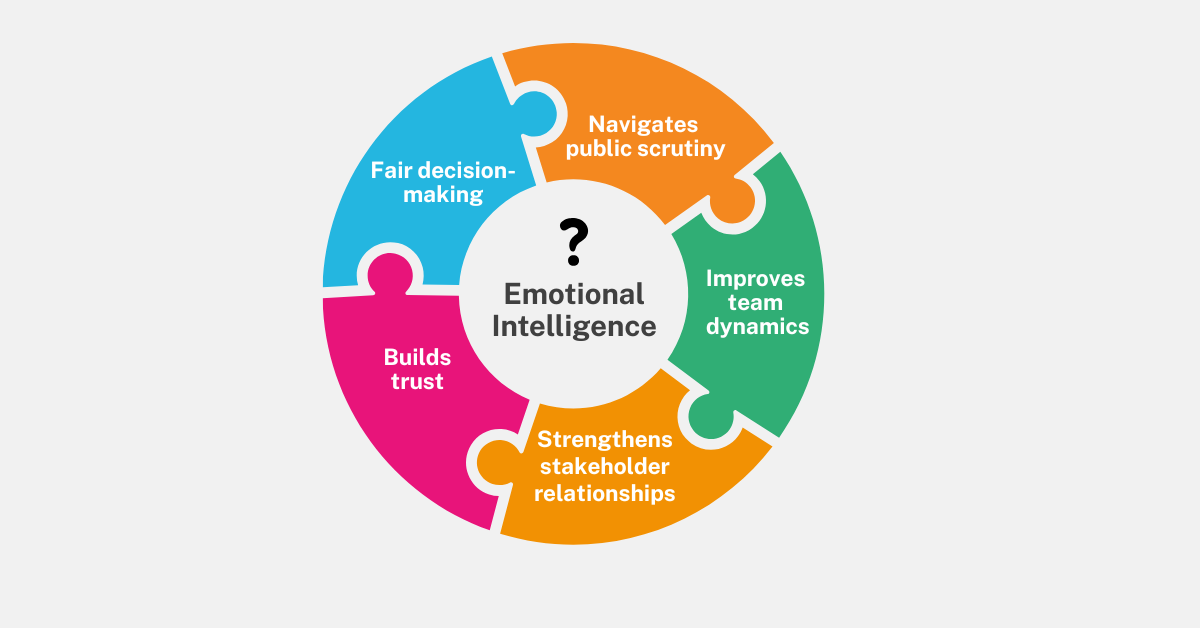Technical expertise is very important in licensing and regulation. However, it’s not enough on its own, regulatory leaders also need emotional intelligence (EI). Whether managing staff, responding to registrant concerns, or guiding strategic direction, a leader’s ability to understand, manage, and respond to their own emotions and that of others can make all the difference.
What is emotional intelligence?
Emotional intelligence refers to the ability to recognize, understand, and manage emotions effectively. It includes self-awareness, self-regulation, empathy, motivation, and social skills. These are soft skills, but they’re core to strong leadership in complex, high-stakes environments like professional regulation.
Why EI is essential for regulatory leaders
- Supports fair decision-making: Regulatory leaders often deal with sensitive situations, such as disciplinary matters, registration appeals, and tough policy decisions. Leaders with strong emotional intelligence are more likely to remain objective, manage personal biases, and navigate emotionally complex scenarios with empathy and fairness.
- Builds trust both internally and externally: Leaders who demonstrate empathy, transparency, and good communication create environments where people feel heard and respected. These builds trust not just with staff and Council, but with registrants, stakeholders, and the public.
- Improves team dynamics and boosts employee morale: Regulatory work can be demanding and high-pressure. EI helps leaders understand what motivates their teams, respond constructively to conflict, and support staff through change. This is especially important in hybrid or remote work settings where informal support is harder to come by compared to a physical work environment.
- Navigates public scrutiny and systemic change: As regulators face growing calls for transparency, equity, and modernization, emotionally intelligent leaders are better equipped to engage in thoughtful dialogue, acknowledge lived experiences, and foster inclusive change.
- Strengthens stakeholder relationships: From health ministries to professional associations, regulators work with diverse partners. Leaders who listen well, regulate their reactions, and communicate clearly are more likely to build effective, long-term relationships.
How regulatory leaders can develop emotional intelligence
The good news is that EI can be developed! Here are some real, actionable ways leaders can strengthen their emotional intelligence in their day-to-day work:
- Practice active listening and ask for feedback: Invite input from your team or board about your communication and leadership style. Also, be open to hearing complex situations. Remember, the goal is to grow, not defend.
- Keep a leadership journal: After a challenging conversation or decision, write down how you felt, how others reacted, and what you learned. Over time, this reflection builds awareness of your emotional patterns.
- Practice empathetic listening: It is important to pause before replying after meetings or 1:1s. Reflect on what you heard before offering solutions. It shows respect and helps avoid misunderstandings.
- Manage triggers proactively: Identify situations or behaviours that tend to upset or frustrate you. Prepare for these moments by rehearsing how you’ll respond calmly and constructively.
- Model emotional honesty: It’s okay to acknowledge frustration or uncertainty. Sharing these feelings appropriately (without venting or blaming) creates space for others to do the same.
- Learn from conflict: Instead of avoiding tension, view disagreements as opportunities to build trust and clarity. Ask, “What’s important to you in this situation?” and look for common ground.
- Build psychological safety: Encourage team members to speak up even when their views differ. Recognize contributions, admit your own mistakes, and show appreciation regularly.
Remember, strong regulatory leadership isn’t just about knowing the rules, it’s about applying them in a way that supports public trust, fairness, and humanity. Emotional intelligence is what allows leaders to bridge technical excellence with ethical, compassionate decision-making, and that’s what regulatory organizations, and the communities they serve, truly need.
Interested in more ways to support leadership and culture in regulation? Read: The Importance of Investing in Team-Building Activities within Regulatory Bodies
Want to learn more about Regulatory bodies in Canada, let Regulatoryguide.ca. be your guide!
